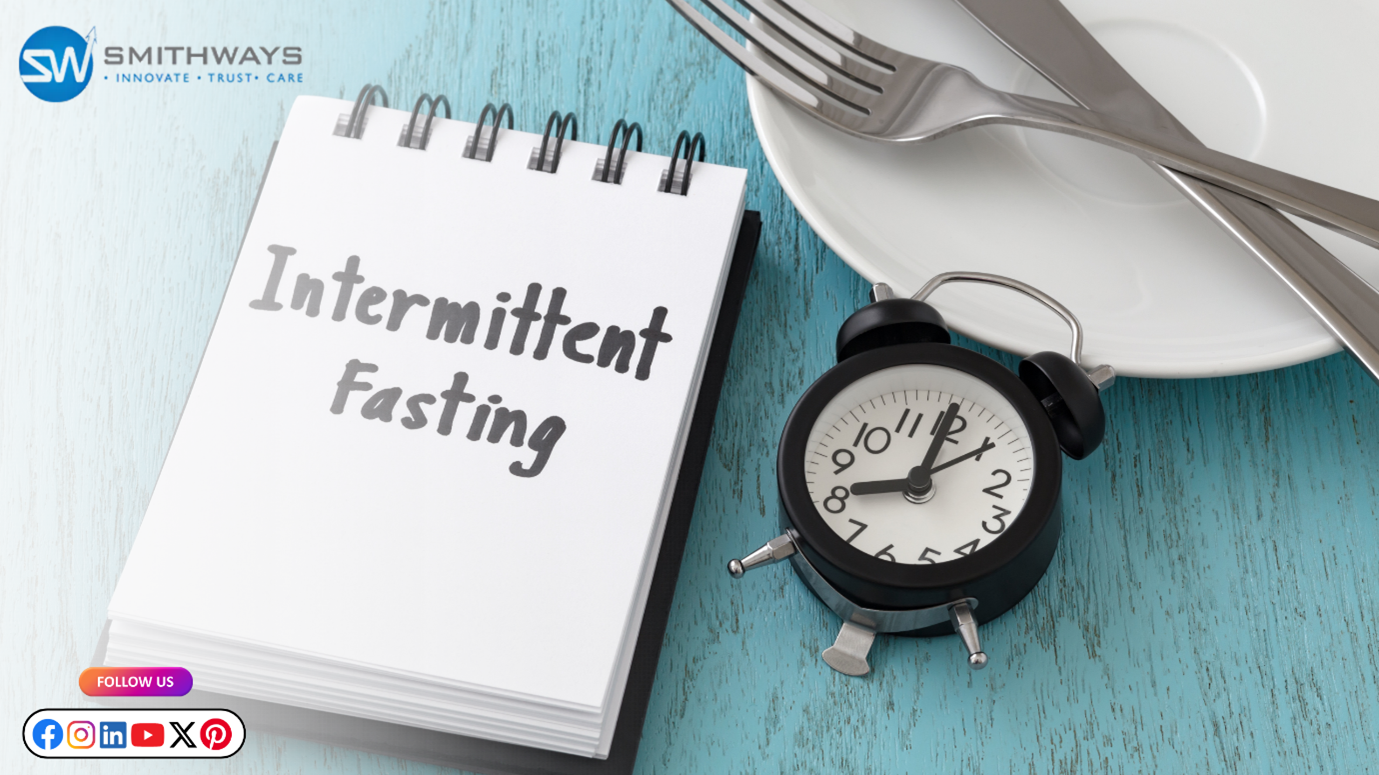Many people in today's health-conscious world are searching for dietary habits that enhance energy levels, metabolism, and long-term well-being in addition to helping with weight management. Intermittent fasting (IF) has emerged as a popular choice, especially among athletes, fitness enthusiasts, and those leading active lifestyles. The difficulty, though, is in maintaining balance, performance, and safety when fasting and intense exercise are combined. Smithways Healthcare can help by pointing people in the direction of efficient and sustainable fasting techniques that complement their fitness objectives.
Understanding Intermittent Fasting
When you eat is more important in intermittent fasting than what you eat. It centres on alternating intervals of fasting and eating, which enables the body to maximize cellular repair, increase insulin sensitivity, and draw from fat stores. Common techniques consist of:
- 16/8 Method: 16 hours of fasting and an 8 hour window for eating.
- 5:2 Approach: Consuming 500–600 fewer calories on two non-consecutive days after five days of regular eating.
- Alternate-Day Fasting: Switching between days when you eat normally and days when you fast.
- Warrior Diet: Consuming a single, substantial meal in the evening and tiny portions of raw fruits and vegetables throughout the day.
Although these techniques may be helpful, the most important thing is to adopt a safe approach to intermittent fasting that doesn't affect performance, muscle recovery, or energy levels.
Why Active Individuals Need a Tailored Strategy
Intermittent fasting can either help or hurt a person who regularly works out. Athletes and fitness enthusiasts must consume more nutrients, burn more calories, and deal with more demands on muscle recovery than sedentary people. Without a carefully thought-out safe approach to intermittent fasting, they run the risk of exhaustion, muscle deterioration, and decreased efficiency.
For active people, some particular factors to take into account are:
- Energy Balance: Ensuring that there isn't a substantial calorie deficit from fasting that impairs performance.
- Nutrient Timing: Arranging meals to coincide with workouts for maximum energy and recuperation.
- Hydration: Preserving electrolyte and fluid balance to avoid dehydration while fasting.
- Adaptation Period: Letting the body acclimate to fasting regimens without jumping right into rigorous training.
Benefits of Intermittent Fasting for Active Lifestyles
Intermittent fasting can benefit active people in a number of ways when done properly:
- Enhanced Fat Utilization: By encouraging the body to use fat as its main fuel source, fasting increases metabolic flexibility.
- Improved Endurance: As their bodies get used to using fat stores effectively, athletes may have more endurance.
- Insulin Sensitivity: By stabilizing blood sugar levels, fasting lessens energy crashes during exercise.
- Cellular Repair & Recovery: By promoting autophagy, or cellular cleansing, IF helps athletes recover from strenuous exercise more quickly.
- Mental Clarity: Numerous people report increased focus, which can result in better performance on cognitive and physical tasks.
The key is balancing these benefits with a safe approach to intermittent fasting that supports training intensity and recovery.
Practical Guidelines for Safe and Effective Intermittent Fasting
1. Choose the Right Fasting Method
Not everyone is suited to every fasting style. Because it provides a stable window for eating to meet nutritional needs, the 16/8 method is generally more sustainable for athletes or fitness enthusiasts. Although it might necessitate careful scheduling around training days, the 5:2 method can also be effective.
2. Prioritize Nutrient-Dense Meals
During the eating window, give special attention to foods high in micronutrients, complex carbohydrates, healthy fats, and protein. Muscle repair and energy replenishment are guaranteed by lean meats, legumes, whole grains, nuts, seeds, fruits, and vegetables.
3. Align Eating Windows with Workouts
If you train in the morning, have a high-protein meal after your workout to break the fast. Eat a healthy meal before working out in the evening and a recovery meal afterward. This alignment is an essentially safe approach to intermittent fasting, as it prevents energy dips during exercise.
4. Stay Hydrated
Water, black coffee, and herbal teas are permitted even when fasting. Drinking enough water guarantees improved performance, lessens weariness, and avoids cramping in the muscles. It can be very helpful to add electrolytes, particularly during hot weather or vigorous exercise.
5. Listen to Your Body
Fatigue, dizziness, and irritability are signs that fasting may not be working for you. A safe approach to intermittent fasting requires self-awareness. Adjust meal timing, calorie intake, or fasting windows based on how your body responds.
6. Supplement When Necessary
Supplements such as multivitamins, omega-3 fatty acids, or BCAAs (branched-chain amino acids) may be necessary for active people who need extra support. During times of restricted eating, these aid in preserving muscle mass and bridging nutrient deficiencies.
Common Mistakes to Avoid
- Overtraining While Fasting: Burnout may result from rushing into intense exercise while fasting for an extended period of time.
- Skipping Recovery Nutrition: Muscle growth and repair are delayed when post-workout meals are neglected.
- Restricting Calories Excessively: Low energy and muscle breakdown are the results of severe deficits.
- Ignoring Sleep: To maximize the benefits of fasting, getting enough sleep is just as important as eating well.
Avoiding these pitfalls ensures a truly safe approach to intermittent fasting without compromising performance.
Who Should Be Cautious?
Even though IF is usually safe, some people should proceed cautiously or consult a doctor:
- Those with a history of eating disorders.
- Pregnant or breastfeeding women.
- Individuals with diabetes or metabolic conditions.
- Athletes in heavy training phases or competitive seasons.
Customization is essential because what suits one athlete might not suit another. Safety is ensured by speaking with an expert before beginning.
Final Summary
If done carefully and with consideration for the body's needs, intermittent fasting can be a great tool for people who lead active lives. Athletes and fitness enthusiasts can reap the benefits without sacrificing energy or performance by concentrating on meal timing, hydration, nutrient quality, and workout alignment. Most importantly, embracing a safe approach to intermittent fasting is the cornerstone of achievement. With knowledgeable advice and customized programs, Smithways Healthcare guarantees that people use sustainable and balanced fasting techniques to attain the best possible fitness results and long-term health.





















